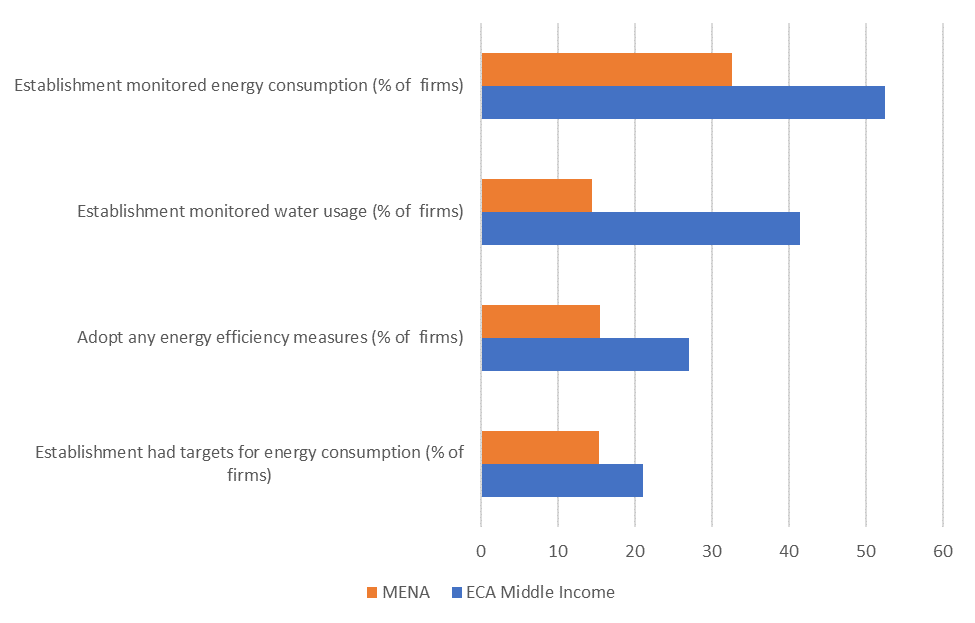 Man and woman engineers working on solar panel. (Getty Images)
Man and woman engineers working on solar panel. (Getty Images)
The recent United Nations Framework Convention on Climate Change (COP27) held in Sharm el-Sheikh, Egypt, has raised the prominence of climate action in the Middle East and North Africa (MENA) region, which will also host COP 28 in the UAE. MENA countries are the most vulnerable to climate change with 60% of the region’s population living in highly water-stressed areas and 20 million people who could be displaced by climate change. A green transition could provide the opportunity for millions of new jobs in the region. Powered by a young population, and the urgency for action, the MENA region can be well positioned to generate green jobs. However, the MENA region’s track record on this score has been spotty, at best.
In our recent report – Jobs Undone – we document how stagnating labor market outcomes undermine economic development and social progress in the MENA region, even a decade after the Arab Spring uprisings. The Jobs Undone report argues that the main reason behind this unmet jobs challenge is a lack of market contestability - the ease of entry, growth, and exit of private sector firms, which characterizes most MENA economies . State-Owned Enterprises (SOEs) in the region continue to play a dominant role and receive preferential treatment regarding taxes, financing, and subsidies. Without competitive pressure, private sector firms in the region have had limited incentives to innovate and expand, including in new “green activities”.
Leveraging new data on the green economy in the World Bank Enterprise Surveys across Europe, Central Asia (ECA), and 6 economies in MENA, the report shows that on average only 16% of firms has adopted any energy efficiency measures in MENA so far. This is almost half the average for middle income economies in ECA (27%) . Firms in the MENA region are also less likely to monitor energy consumption (only 33% of firms), set energy consumption targets (15% of firms), or monitor water usage (14% of firms). The latter is particularly low in MENA. By contrast, the average for middle-income ECA economies is far higher at 42% (Figure).
Figure: Low Monitoring and Adoption of Energy Efficiency Measures

Source: World Bank Enterprise Surveys. MENA economies include Egypt, Jordan, Lebanon, Morocco, Tunisia, and West Bank and Gaza. The ECA Middle Income average consists of 19 economies. The surveys were conducted circa 2018-2019. The timeframe of all the indicators is over the three years preceding the survey. For example, managers were asked “over the last three years, did this establishment monitor its energy consumption.”
In terms of specific climate measures, only 9% of firms in MENA adopted any air pollution control measures, 9% engaged in climate-friendly energy generation on site, 11% adopted water management measures, and 23% adopted energy management measures. For the firms in MENA that did not adopt any measures, 67% indicated that it was not a priority relative to other investments, while 18% pointed to a lack of financial resources. Some caution needs be applied in interpreting these numbers. The businesses surveyed were asked if they adopted these measures within the three years prior to the survey. Middle income economies in ECA may have already adopted these measures more than three years prior to the survey, and in this case the numbers would be deflated. Similarly, MENA economies may not have adopted these measures within three years prior to the survey, and thus the numbers may be inflated. Implicit in this comparison is that the adoption of these measures was on average roughly similar for both MENA and ECA middle income economies 3 years prior to the survey.
This means that the private sector in the MENA region is not yet focusing on good green management. Yet we know that green initiatives cannot fully succeed without the involvement of the private sector.
There is a great opportunity in encouraging the green economy for the MENA region. The Country Climate and Development Report (CCDR) for Morocco, Egypt, Jordan and Iraq estimate that investing in renewable energy and energy efficiency could result in considerable additional new job opportunities between 2020 and 2050.
Recognizing the political economy of market contestability, the Jobs Undone report suggests that a politically feasible path to reform is to focus first on emerging sectors, where few incumbents and interest groups have power. Governments can facilitate the emergence of new occupations, so the disruption for existing workers is less evident—and the new activities can even be complementary, rather than replacing existing jobs. The green economy could be one such avenue if done right.
The next COP will be held in MENA again – in the United Arab Emirates. Meaningful progress can be made between now and then, as long as the public and private sectors have the will and determination to do so.
This is the first of a four-part blog series sharing insights generated by the World Bank flagship report Jobs Undone: Reshaping the Role of Governments toward Markets and Workers in the Middle East and North Africa. Part 2 discusses young people and jobs in the region, Part 3 presents evidence on the evolution of the private sector in MENA, and Part 4 explores policy responses by MENA governments to create more contestable markets for better jobs.




Join the Conversation